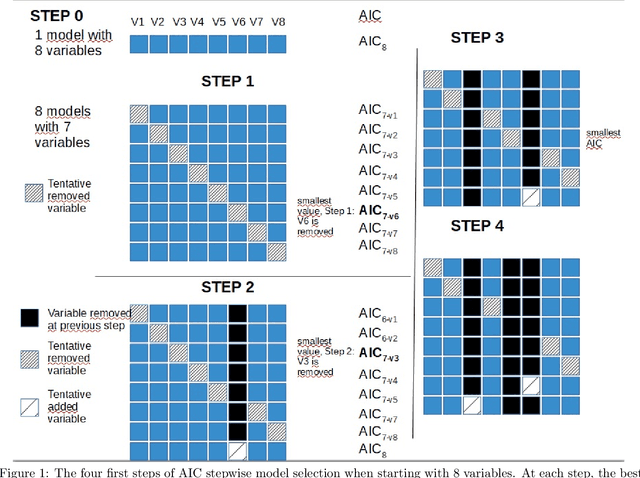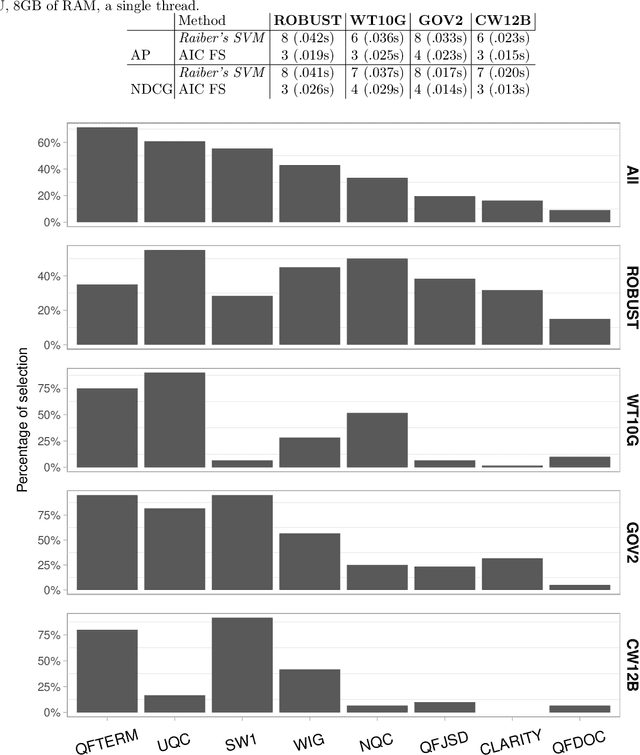Md Zia Ullah
Uncovering the Limitations of Query Performance Prediction: Failures, Insights, and Implications for Selective Query Processing
Apr 01, 2025Abstract:Query Performance Prediction (QPP) estimates retrieval systems effectiveness for a given query, offering valuable insights for search effectiveness and query processing. Despite extensive research, QPPs face critical challenges in generalizing across diverse retrieval paradigms and collections. This paper provides a comprehensive evaluation of state-of-the-art QPPs (e.g. NQC, UQC), LETOR-based features, and newly explored dense-based predictors. Using diverse sparse rankers (BM25, DFree without and with query expansion) and hybrid or dense (SPLADE and ColBert) rankers and diverse test collections ROBUST, GOV2, WT10G, and MS MARCO; we investigate the relationships between predicted and actual performance, with a focus on generalization and robustness. Results show significant variability in predictors accuracy, with collections as the main factor and rankers next. Some sparse predictors perform somehow on some collections (TREC ROBUST and GOV2) but do not generalise to other collections (WT10G and MS-MARCO). While some predictors show promise in specific scenarios, their overall limitations constrain their utility for applications. We show that QPP-driven selective query processing offers only marginal gains, emphasizing the need for improved predictors that generalize across collections, align with dense retrieval architectures and are useful for downstream applications.
Effectiveness and Efficiency Trade-off in Selective Query Processing
Feb 22, 2023Abstract:Query processing in search engines can be optimized for use for all queries. For this, system component parameters such as the weighting function or the automatic query expansion model can be optimized or learned from past queries. However, it may be more interesting to optimize the processing thread on a query-by-query basis by adjusting the component parameters; this is what selective query processing does. Selective query processing uses one of the candidate processing threads chosen at query time. The choice is based on query features. In this paper, we examine selective query processing in different settings, both in terms of effectiveness and efficiency; this includes selective query expansion and other forms of selective query processing (e.g., when the term weighting function varies or when the expansion model varies). We found that the best trade-off between effectiveness and efficiency is obtained when using the best trained processing thread and its query expansion counter part. This seems to be also the most natural for a real-word engine since the two threads use the same core engine (e.g., same term weighting function).
Forward and Backward Feature Selection for Query Performance Prediction
Dec 04, 2019


Abstract:The goal of query performance prediction (QPP) is to automatically estimate the effectiveness of a search result for any given query, without relevance judgements. Post-retrieval features have been shown to be more effective for this task while being more expensive to compute than pre-retrieval features. Combining multiple post-retrieval features is even more effective, but state-of-the-art QPP methods are impossible to interpret because of the black-box nature of the employed machine learning models. However, interpretation is useful for understanding the predictive model and providing more answers about its behavior. Moreover, combining many post-retrieval features is not applicable to real-world cases, since the query running time is of utter importance. In this paper, we investigate a new framework for feature selection in which the trained model explains well the prediction. We introduce a step-wise (forward and backward) model selection approach where different subsets of query features are used to fit different models from which the system selects the best one. We evaluate our approach on four TREC collections using standard QPP features. We also develop two QPP features to address the issue of query-drift in the query feedback setting. We found that: (1) our model based on a limited number of selected features is as good as more complex models for QPP and better than non-selective models; (2) our model is more efficient than complex models during inference time since it requires fewer features; (3) the predictive model is readable and understandable; and (4) one of our new QPP features is consistently selected across different collections, proving its usefulness.
 Add to Chrome
Add to Chrome Add to Firefox
Add to Firefox Add to Edge
Add to Edge